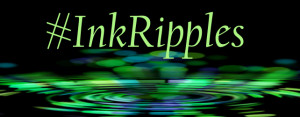 When I think about the July #InkRipples topic of heroes/villains, I always think about the many quotes along the lines of everyone is the hero of their own story (there are so many versions of this quote with different attributions, I’m not even going to try attribute a direct quote).
When I think about the July #InkRipples topic of heroes/villains, I always think about the many quotes along the lines of everyone is the hero of their own story (there are so many versions of this quote with different attributions, I’m not even going to try attribute a direct quote).
I think this idea is especially interesting when applied to villains. The most interesting villains feel totally justified in their actions in their own minds as opposed to a villain who is presented as simply an evil character. We may judge those actions to be horrible, but for whatever reason–be that twisted or misguided or maybe a little justified but still ultimately bad–the villain considers themselves the hero.
On the flip side, others may view the hero of a story as a villain. Perhaps what the hero sees as a justified, noble deed is harmful to another. Now the person being harmed may be harming others and the moral thing to do is to stop them, but they will still categorize the hero as a villain in their own mind. And no hero of a story should be perfect…that would be boring. Heroes need to have flaws.
As a writer, it’s really all about how the story is framed. Vengeance can be a way for a reader to relate to and root for a hero, or it could be the means by which a character becomes a villain. I find stories with lots of shades of gray in the good vs. evil area to be incredible compelling.
What’s your take on heroes and villains?
#InkRipples is a monthly meme created by Katie L. Carroll, Mary Waibel, and Kai Strand. We pick a topic (July is all about heroes/villains), drop a ripple in the inkwell (i.e. write about it on our blogs), and see where the conversation goes. We’d love to have you join in the conversation on your own blogs or on your social media page. Full details and each month’s topic can be found on my #InkRipples page.





















Hi Katie, The hardest part in creating a story is the creation of genuine characters. Those characters have to have strong motivations to keep the story going. If the villain is simply a bad guy that does bad, there’s nothing to relate to. The same in the reverse for the hero. Anything could push any of us over the edge. If someone threatens the people we love. If someone threatens our way of life or our moral fiber. Those kinds of things might push us from nice guy to bad guy (look at Walter White in Breaking Bad). In my first book, The Clock Strikes Midnight, my character was definitely not very good. In fact she’d done a lot of bad things. I had to figure out a way for the readers to relate to her and pull for her. Apparently, from the reviews, I managed to do that. One of the reasons I didn’t like Gone Girl was there were no redeeming features with either of the two main characters. They both annoyed me and it was worse because they seemed to get away with whatever bad things they did. I couldn’t pull for either.
As a writer finding that place where whether hero or villain seems a real person with real issues is quite the challenge.
Great points, Joan! I have a main character in one of my unpublished novels that has done some pretty bad things and I worked very hard to make her at least relatable, if not necessarily likeable. It is a tricky thing to have the right balance for a hero or a villain.
It seems we share the same views. No surprise there! Thanks for suggesting this category this year, Katie. I love talking about the muddy waters of heroes and villains.
Doesn’t surprise me at all that we have similar thoughts about heroes and villains! Glad you enjoyed my topic suggestion…you came up with so many of the others this year to great reception. 🙂
I will admit to loving the occasional sociopath who loves torturing/maiming/murdering people for fun, but for the most part, villains need to believe in what they’re doing–and I often find they get more character development than the heroes because the author needs to give them an internal justification for the terrible things they do.
I, too, can get on board with the occasional sociopath who is just bad, bad, bad. In their own way, the sociopathy is the justification for their actions. But that kind of pure evil character can get old as well.
I think it makes the villain more interesting if he/she has a good point or two, then the reader can find something to like. Same for the hero, who should not be perfect. Let him/her have some faults, like real people do.
Great article, Katie.
Thanks, Beverly! It’s fun as a reader and writer to add that relatable element to the villain.